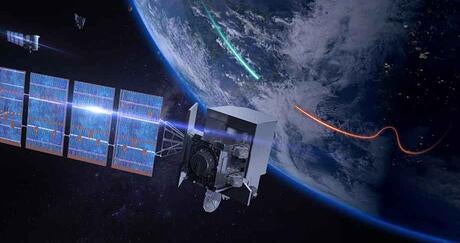Deep in the woods of Northern California, a tiny spark ignites and begins to smolder the surrounding forest. Meanwhile, a weather satellite equipped with the world’s most advanced infrared imager – L3Harris’ Advanced Baseline Imager (ABI) – has quickly detected the faint hotspot and notifies first responders in real-time. Before smoke is even seen from the ground, firefighters have a one-up on a potential forest fire.
Now imagine having to detect a faint hotspot, moving unpredictably at five times the speed of sound – about 1 mile per second.
That's the exact challenge the U.S. military is facing with the emergence of hypersonic missiles.
“The sobering reality of the tragic events in Ukraine, in which Russia has used and continues to use a broad array of missiles to attack and, in my opinion, terrorize civilian populations, highlights the extent to which our adversaries are prepared to use missiles in a conflict,” testified John Plumb, first-ever Assistant Secretary of Defense for Space Policy, before the Senate Armed Services Committee in May 2022. “Missile defenses are critical for defending the U.S. homeland and for defending our deployed forces and our allies and partners.”
The U.S. needs a precise solution to outmaneuver our adversaries, and they need it now.
By combining its legacy of trusted expertise in infrared imaging with digital engineering methodologies, L3Harris is on the fast track to disrupting the missile defense industry.
The HBTSS Program: Protecting the U.S. and Our Allies from Hypersonic Missiles
The U.S. is in a hypersonic arms race against Russia and China, one that’s changing the tempo of modern combat.
As the nation’s near-peer adversaries develop and deploy advanced missiles, our ability to detect these lethal weapons has become crucial for the safety of our country and our allies.
The Missile Defense Agency (MDA) is focused on honing the United States’ ability to detect and track traditional and emerging missile threats with its Hypersonic and Ballistic Tracking Space Sensor (HBTSS) program. In early 2021, after a down select, the MDA awarded L3Harris a $121-million contract for Phase IIb of the HBTSS program: the on-orbit prototype demonstration.
By the end of that same year, L3Harris had already successfully completed the critical design review (CDR) for its HBTSS prototype – ensuring the design met MDA’s performance, cost and schedule requirements – and moved on to building the demonstration satellite.
How did L3Harris achieve this so quickly? … The answer is by merging its forward-leaning digital engineering approach, deep mission knowledge and expertise in infrared imaging.
Removing the Need to Bend Metal – The Promise of Digital Engineering
Digital engineering played a critical role in the success of HBTSS. But let’s level set: what is digital engineering in the first place?
In short, digital engineering is a collection of connected tools and processes that allow us to develop, test and improve systems digitally – before spending any time or money developing a physical prototype (i.e., “bending metal”).
It’s a paradigm shift away from the traditional engineering process, where companies build hardware first to test the system’s design and then make necessary adjustments.
This approach makes high-speed, low-risk, cost-effective technological development possible.
Harnessing the Power of Digital Twins to Create Perfectly Tuned On-Orbit Algorithms
Digital transformation is all about leveraging technology to do things we never thought were possible.
With digital engineering, L3Harris was able to virtually analyze multiple HBTSS design configurations against the threat, test them through simulation, perform various operational assessments concurrently and make rapid improvements.
The result was a perfectly tuned set of on-orbit algorithms that support the detection and tracking of advanced missiles through the multiple stages of flight and potential atmospheric conditions when paired with L3Harris’ precision infrared imaging instruments.
By tuning the algorithms with digital twins, L3Harris was able to recognize 90% cost savings and rapidly develop a HBTSS solution that was optimized for success.
If you’re wondering what digital twins are, they’re a set of virtual information constructs that mimic the structure, context and behavior of a physical asset. Digital twins enable engineers to see the effect of a design change on the final product by harnessing the power of extremely accurate modeling and simulation.
This technique provides maximum agility while saving millions of dollars in the process.
L3Harris also created cost and time efficiencies by using digital engineering to track requirements to different parts of the HBTSS prototype design.
If L3Harris had taken a more traditional engineering approach by using document-based artifacts to trace requirements and building hardware first to test the design, cost efficiency, project timeline and overall quality all would have suffered.
At its core, digital engineering drives process efficiencies, reduces development costs and improves quality, enabling us to bring better products to market faster.
With this understanding, L3Harris relied heavily on digital modeling and simulation to demonstrate capabilities and validate the system’s design. And it paid off.
The Space Development Agency (SDA) Tracking Layer Tranche 0: Success Breeds Success
One of the many benefits of embracing digital engineering is that successes are transferrable.
In fact, L3Harris leveraged its digital methodology from HBTSS to win a $193-million contract award for a separate program related to missile defense: the SDA Tranche 0 Tracking Layer.
The pace at which L3Harris’ satellite design for Tranche 0 progressed from original contract award to authorization to proceed (ATP) was unprecedented for a sensor of its complexity – a feat made possible by digital engineering.
Because of this accomplishment, L3Harris was recognized for its commitment to supporting the nation’s critical security needs and for sustaining such a rapid development pace to address present and evolving missile threats.
And the success L3Harris experienced within the SDA’s Tranche 0 Tracking Layer program didn’t end there.
With the help of digital engineering, L3Harris is redefining how to develop and deploy missile warning and defense satellites.
“Eyes in the Sky:” SDA Tracking Layer Tranche 1
L3Harris’ achievements across the MDA HBTSS and SDA Tranche 0 programs have set the strategic way forward for rapidly deploying relevant mission capabilities to our nation’s warfighters.
In the midst of successfully executing both programs, L3Harris was awarded yet another contract related to missile warning and defense – the prototype agreement, with a total potential value of $700 million, to build the SDA Tranche 1 Tracking Layer.
L3Harris will build a 14-vehicle satellite constellation to serve as “eyes in the sky,” detecting, identifying and tracking advanced missile threats.
The Tranche 1 win demonstrates the company’s ability to nimbly scale from initial demonstration to proliferation with enhanced mission capability, resilience, global coverage and speed to deployment.
“Resilient missile tracking architecture is a crucial component to the overall DoD integrated deterrence effort, and this win proves we offer cutting edge solutions for that mission,” said Kelle Wendling, President, Space Systems, L3Harris. "As our multiple national security space partners track a range of evolving threats, we will continue to focus our investments to improve the entire chain of detection, tracking, targeting, and engagement options warfighters require."
The Moral of the Story: Fast Changes Everything
In today’s battlespace, fast changes everything. That’s why we’re using digital engineering to rapidly address urgent threats, like hypersonic missiles, and bring mission-critical capabilities to market faster.
L3Harris’ approach to delivering solutions for both MDA and SDA demonstrate that early missile warning and tracking missions can be efficient, affordable and developed at a pace that keeps up with emerging threats.
The time to fully embrace the future of engineering is now.



